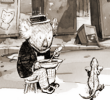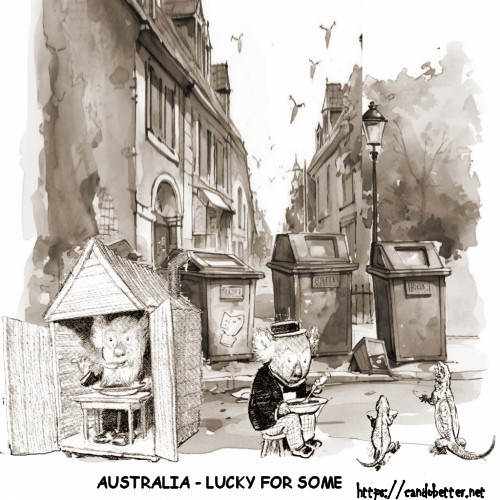 Donald Horne, who wrote ironically about Australia as 'The Lucky Country,' thought that Australia was run mainly by second-rate people who share its luck but now, 60 years later, we don't even know who runs the country.
Donald Horne, who wrote ironically about Australia as 'The Lucky Country,' thought that Australia was run mainly by second-rate people who share its luck but now, 60 years later, we don't even know who runs the country.
Running at a loss
Australia is the world's largest exporter of iron ore and bauxite, the second-largest exporter of gold, manganese, and lead, while zinc, cobalt and uranium exports are the third-largest. In 2023 Australia exported 835m tonnes of iron ore (enough to make 521m tonnes of steel) worth $124b, and 13m tonnes of coking coal, which is the stuff needed to produce steel. So, despite having all the ingredients for steel making - including solar power for green steel - we only produced 5 m tonnes locally (down from 10 m tonnes in 1981) and had to import about $6b worth of steel from the customer who bought our iron ore.
Our coal exports now make up 35% of the world trade and LNG exports now account for 20.1% of global LNG shipments, after overtaking Qatar to briefly become the world's largest exporter. But our pricing system leaves much to be desired, because Australian gas users pay up to 65% more for gas than our customers in Japan. In 2018 Australia's LNG exports earned just $600m, about the same as the revenue from the beer tax, while Qatar earned $26.6b. And when it comes to revenue-raising, Australian Taxation Office statistics reveal that the Government collects more money from HECS than it does from the Petroleum Resource Rent Tax leaving 3 million Australians with an average debt of $24,700.
Selling raw or unprocessed materials is the least effective way of operating an economy, worthy of the derogatory term 'Banana Economy.' Banana Economy is a tag that could easily be applied to Australia, because our economy is dominated by industries that derive significant revenue from exporting bulk materials. As well as minerals, we export most of our meat - sheep and beef - via the controversial live export trade, even though there are many avenues for value-adding, including a growing world demand for prepared meals. This bulk-export mentality also extends to our wheat exports where pasta production has stagnated in the face of imported pasta, possibly made with Australian wheat. The situation is even worse with our fiber exports - wool and cotton - because 99.9% of Australia's cotton is exported as there are no cotton spinning mills in Australia. The same applies to wool where over 90% is exported as 'greasy wool,' straight from the sheep's back, even though the markup on the final product of fashion clothes that we import is astronomical.
The process of exporting cheaply and importing expensively can only be maintained by massive increases in exports. We are doing this with all our major income streams, even when it creates environmental or social problems. The mineral sands industry did enormous damage to East Coast beaches and has probably contributed to their current instability as well as to the proliferation of weeds, which were deliberately introduced to stabilize the dunes. Australia's massive population-growth induced housing and infrastructure crisis, has been exacerbated due to a shortage of materials, including timber, yet we exported 1.6 million tonnes of saw logs and 2.4 million tonnes of pulp logs to China in 2019, for a return of $1.6b. Over the same period, timber imports were $6.9b.
It is also quite likely that some of the timber extraction was illegal since, in 2020, 96% of the trees felled in the NSW region of Eden were wood-chipped, where clause 31.4 of the Coastal IFOA Protocols provides that:
“an operation must not be conducted for the primary purpose of producing low quality logs (including salvage and firewood) and pulp logs.”
(Source: "Coastal Integrated Forestry Operations Approval – Protocols," Part 5, Timber Product Requirements, 31.4 at https://www.epa.nsw.gov.au/your-environment/native-forestry/public-native-forestry/integrated-forestry-operations-approvals/coastal-ifoa.
Australia's logging operations constitute a severe ecological threat to native species, in that they both remove habitat trees and make forests more vulnerable to fire. See Environmental Defenders Office submission, "Submission to the inquiry into the long term sustainability and future of the timber and forest products industry," 3 June 2021.)
Perhaps because of the ease of obtaining cheap timber from compliant countries like Australia, our major trading partners have been able to preserve their forests. Both China and Japan have bans on logging their native forests and China's forest cover has increased by 647, 172 km2 since 1990. In Australia the trends go in the opposite direction, as Australian native forests continue to be cleared, while according to Australian Bureau of Agricultural Economics figures, Australia’s plantation area, which is supposed to spare the native forests, contracted to 1.716 million hectares in 2021-22 – a reduction of more than 28,000 hectares. (https://ausfpa.com.au/abares-report-shows-continued-decline-in-australias-plantation-estate/ See also comment at https://www.afr.com/companies/agriculture/this-is-not-sustainable-timber-processors-warn-after-trade-ban-lift-20230518-p5d9em)
"Despite most (∼75%) of Australia’s 7.6 million-km2 area being covered in inhospitable deserts or arid lands generally unsuitable to forest growth, the coastal periphery has witnessed a rapid decline in forest cover and quality, especially over the last 60 years." (Corey J.A. Bradshaw, "Little left to lose: deforestation and forest degradation in Australia since European colonization," Journal of Plant Ecology, Volume 5, Issue 1, March 2012, Pages 109–120, https://doi.org/10.1093/jpe/rtr038.)
Market economics, the process that usurps control from an elected body and allows corporations free reign
While this is a terrible indictment of our government's economic credentials, it is a victory for what is known as market economics, the process that usurps control from an elected body and allows corporations free reign. When coupled with more than a whiff of corruption - and an unregulated lobbying system, these corporations - mainly overseas-owned - rub salt into the wounds they have created by winning government subsidies to assist them in stealing our resources. Even in a time of heightened concern about climate disasters, governments provided $11.1b in fossil fuel subsidies. (In 2021, the Corruption Perception Index from Transparency International (TI)’s latest Corruption Perceptions Index (CPI) reports have shown very poor results for Australia, which in 2021 was in 18th place, scoring just 73 points on the 100-point scale, the worst result Australia has ever received since Transparency International’s new methodology began in 2012. (See https://www.transparency.org/en/cpi/2023/index/aus.)
Choosing between koalas and orangutans
There is evidence that state governments have been propping up the native forest logging industries that are operating at a loss, causing Australian Forest Products Association chief executive Joel Fitzgibbon, ( the ex MP of the Hunter) to warn that ending native forest logging could cause global environmental harm by increasing the need for imports of hardwood timber. His comment has some validity since 70% of timber imported from Indonesia is illegally logged and forest loss is threatening the orangutan. It does however show how lax or corrupted our timber industry is when we have to choose between saving the koalas or the orangutan.
There are other cases of government largess that assist foreign corporations, such as the subsidies to the aluminum industry through cheap electricity. The price of this subsidy remains confidential, but has been estimated to be about $157,000 per employee. And just to show their green credentials, the government announced a $2 billion expansion in critical minerals financing, which will help position Australia as a world leader in digging holes.
However when it came to supporting the manufacturing industries, successive governments have claimed that we cannot compete with low-wage countries without subsidies or tariff protection, an apparent sin against the accepted wisdom of Free Trade. The resulting almost complete collapse of manufacturing was bad for employment and destroyed the prospect of Australia as a smart country because ingenuity flourishes in the presence of engineering. Manufacturing decline was also very convenient for the freeloaders like mineral exporters whose products now had to pay for the increased imports of the things we used to make. Our dependence on their product gave the corporations even more power, and ensured that governments would not look too closely at their tax returns (Overall, one-third of companies with revenues over $100 million, or 710 firms, didn’t pay any tax at all.) or the manipulation of their finances in processes like price transfer which shifts profits to overseas subsidiaries.
Instead of taxing mining, we tax students in this upside-down economy
The loss of manufacturing industries was especially beneficial for developers who were fortuitously gifted with abandoned industrial sites, often located near rail or, better still, river transport routes. Rezoning of these sites not only stymied a future manufacturing industry but also provided developers with windfall profits that did not translate into affordable housing, and are the same type of 'unearned income' enjoyed by the mining industry. The absurdity of our taxation system as it applies to unearned income was demonstrated by the Australia Institute's Richard Denniss who remarked;
“ In Norway, they tax the fossil fuel industry and they give university education away for free.” In Australia, we subsidize the fossil fuel industry and we charge our kids a fortune to go to university because the Australian Government collects more money from HECS than it does from the Petroleum Resource Rent Tax”. (https://www.macrobusiness.com.au/2024/02/canberra-collects-more-from-hecs-than-oil-and-gas-industry/)
NOTES ON ILLUSTRATIONS
The cartoon was done by Sheila Newman by cutting and pasting from Norman Lindsay's The Magic Pudding, (1918) which was like an earlier, funnier, version of The Lucky Country, and one of the best books ever written. Norman Lindsay did his own illustrations and was one of Australia's greatest artists. I have committed sacrilege (again) but cutting and pasting from his picture of Benjamin Bluegum and his uncle, and some begging lizards. Benjamin and his uncle were originally portrayed as housed much more comfortably in a treehouse in Australian gum tree, although Benjamin used to sit outside his uncle's abode because he objected to his uncles' whiskers dragging in his uncle's soup. I have them residing on the street in a slum because finding accommodation these days is hard for humans and even harder for wildlife. The background (distorted)was from https://clipart-library.com.

Add comment